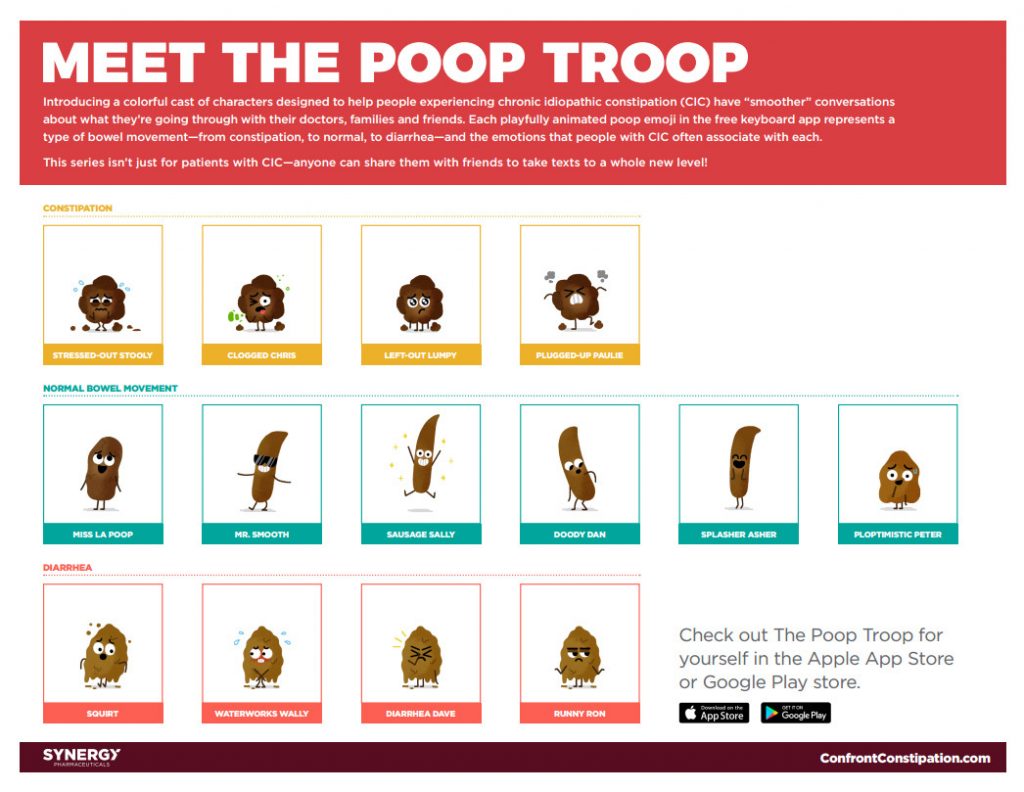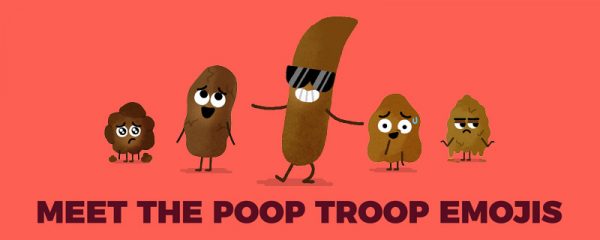 “Constipation is hard. Talking about it is even harder,” reads a card I received from the senior director of marketing at Synergy Pharmaceuticals.
“Constipation is hard. Talking about it is even harder,” reads a card I received from the senior director of marketing at Synergy Pharmaceuticals.
Emojis-meet-direct-to-consumer pharmaceutical promotion in a new campaign from the drug company, which is embarking on a disease education campaign to bring greater awareness to the condition of chronic idiopathic constipation (CIC). This condition impacts 14% of the global population.
The messengers for this effort are a cast of emojis who populate a continuum from constipation-to-diarrhea and every poop step in-between. Meet The Poop Troop:
- Stressed-Out Stooly
- Clogged Chris
- Left-Out Lumpy
- Plugged-Up Paulie
- Miss La Poop
- Mr. Smooth
- Sausage Sally
- Doody Dan
- Splasher Asher
- Ploptimistic Peter
- Squirt
- Waterworks Wally
- Diarrhea Dave, and
- Runny Ron.
Synergy Pharmaceuticals recently published results of a survey conducted among patients and healthcare providers on the frustrations in dealing with the condition. Key findings were that:
- Most patients and providers feel a lack of symptom relief and treatment satisfaction with current available products treating CIC
- The key side effect of current treatments, diarrhea, is unacceptable to both patients and providers: 82% of healthcare providers and 70% of patients do not agree that diarrhea is an acceptable treatment outcome, the poll found.
This campaign has been strategically honed with a heavy dose of market research on the psychographic level, and patient/user experience. Dr. Anish Sheth, Chief of Gastroenterology at the University Medical Center of Princeton, wrote the forward in The Poop Troop booklet introducing the emojis’ clinical personae. Dr. Sheth is the co-author of the book, What’s Your Poo Telling You. This booklet is packed with humor and self-effacing puns, featuring a seal calling the concept a “Poolitzer Prize Winner,” and quoting a “Dr. John,” opining, “Sure to inspire bowels across America.”
Given the target market, the campaign has a twitter hashtag: #ConfrontConstipation. The emojis can be downloaded from the Apple App Store or Google Play store.
Health Populi’s Hot Points: I tested this concept on an N of 2 this weekend: my young Boomer husband and my Millennial daughter, who happens to be a service design student at SCAD, the Savannah College of Art and Design. Their respective reactions to this campaign were informative to me.
For the younger market research subject, who is deep into UX design, this campaign was a big hit. She found it thoughtful, informative, and entertaining. She told me that many peer-friends indeed talk about poop with each other. Some even text from the toilet while in the process of toileting.
 The impact and entertainment value of the whole poop emoji-concept eluded the older market research subject. Ironically, I had just received “Emoji Love,” a planner-journaling kit from the Simple Stories company that uses emojis as a theme, including the poop emoji (the product line is part of a larger theme called, appropriately, “Carpe Diem”). It’s pictured here; see the poop emoji on the top line of the graphic. When I showed this journaling kit to my husband, just a day before I shared The Poop Troop campaign, he just shook his head and wondered why and how I could/would use this in my planner diary and journal.
The impact and entertainment value of the whole poop emoji-concept eluded the older market research subject. Ironically, I had just received “Emoji Love,” a planner-journaling kit from the Simple Stories company that uses emojis as a theme, including the poop emoji (the product line is part of a larger theme called, appropriately, “Carpe Diem”). It’s pictured here; see the poop emoji on the top line of the graphic. When I showed this journaling kit to my husband, just a day before I shared The Poop Troop campaign, he just shook his head and wondered why and how I could/would use this in my planner diary and journal.
That’s market research for you, and no doubt Synergy Pharmaceuticals wasn’t aiming at the head and heart of a middle-aged guy who doesn’t have to deal with CIC on a daily basis.
In the health/care ecosystem context, this medicine segment is part of what I forecast as a growing basket of self-care treatments and technologies, based on consumers’ desire to live well and fully engaging in self-health. While some observers and analysts may scoff at the concept, if you are a person dealing with CIC and similar gut and bowel conditions, tactics and tools that help us live life on our own terms — such as dealing with runny uncontrollable stools — are front-of-mind and major daily hassles.
As a DTC campaign, there are two other aspects of this strategy I like: the use of the word “confront” in the hashtag, which supports full-on health engagement and self-awareness and empowerment; and, the use of humor for a situation that the sufferer more often than not doesn’t find all that funny.
Note: Synergy Pharmaceuticals is not a client of THINK-Health. This post was written to explore the ongoing evolution of DTC promotion in healthcare, and the use of popular culture in healthcare marketing.





 Thanks to Feedspot for naming this blog, Health Populi, as a
Thanks to Feedspot for naming this blog, Health Populi, as a